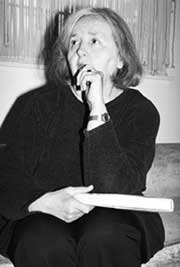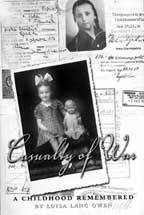                                                |
|
 |
|
Local resident Luisa Lang Owen will read from
her memoir, ‘Casualty of War: A Childhood Remembered’
(inset), tomorrow (Friday), 6 p.m., at Epic Book Shop.
|
Local
author Luisa Lang Owen—
Writing
to grieve, then to remember
“The book is the important thing,” she said, resting her hand
on five years of work bound up in hardcover copy. More than 50 years after
the horrors of her childhood, Yellow Springs resident Luisa Lang Owen
is anxious that people know the story.
Her words flow out like an undammed river with the curl and cadence of
someone who once spoke German, Serbo-Croatian and Hungarian in a small
Yugoslavian village. She has dredged up memories she didn’t even
know she had in order to tell the story right.
“I want people to realize what was lost,” she said. “The
disintegration of someone’s life when they are discarded from their
home.”
The year 1945 was the beginning of the end of the life Owen knew as a
child. In the years directly following World War II, thousands of ethnic
Germans throughout Yugoslavia and eastern Europe were forced from their
homes and rounded up into concentration camps. Victims were killed, beaten
and made to work like slaves for the atrocities their ethnic brethren
had committed during the war, according to Owen.
Owen’s memoir,
Casualty of War: A Childhood Remembered, tells the story of a lush, rich
childhood run violently off its tracks. She began writing her story after
seeing on TV the gaunt, drawn faces of Serb and Croat refugees displaced
from their homes during the conflict in Bosnia and Kosovo in 1992.
“When I saw people behind barbed wire . . . and people were denying
Milosovic had concentration camps, I identified myself with them, and
I knew I should write this down,” Owen said.
 |
|
|
She had been back
to her hometown a few years before, visiting the unmarked graves of those
she had known. Stepping into her childhood home and hearing the water
flowing from the village artesian well, she began to remember what she
had been forced to leave.
“I would cry myself to sleep writing at night, but they were all
laments and I realized no one would want to read them,” she laughed.
After writing to grieve, she wrote to remember. And she became excited
by the power of her physical memory, the gems uncovered by the memory
of a feeling.
“Searching through my memory, it was so exciting to find out what
I would find next,” Owen said. “Once I started it was like a
pit that swallowed me up.”
Teaching art education at Wright State University by day, Owen whittled
her unwieldy load of laments to a substantial 500 page tome. The book
took another five years to edit and publish, but she never faltered in
her faith that her story would be heard.
The process of telling her story was not a private one, Owen said. She
felt she could “throw herself away,” or serve as a representative
for thousands whose suffering went unacknowledged.
She also made clear the point of her telling was anything but to accuse.
She wanted to show how people hurt each other by dividing along ethnic
lines, she said. As she discovered, shortly after her family was freed
from the camps, the discrimination against her was caused by nothing more
than a name.
Owen came to America with her parents shortly after their internment to
live with relatives in Cincinnati. She married and raised children and
now grandchildren in Yellow Springs. Now her 12-year-old granddaughter
Marina, who lives across the street from her, is reading her story.
“My granddaughter called me on the phone to tell me she is on chapter
11!” Owen said, barely able to contain her excitement. “She
told me the parts she liked the best, and now it’s as if I had written
it just for her.”
But she has written the book for many others as well. Recently in Springfield,
Owen met the granddaughter of the man in power in postwar Yugoslavia.
After they talked and found respect for one another, Owen gave the woman
the book to take back to her country.
“The book is going where it is most denied,” Owen said. “That
the book should be read in Yugoslavia would be an acknowledgment.”
Owen wrote her story also in memory of her parents, who had brought her
so far. Before she died early last year, Owen’s mother talked to
a relative about her daughter.
“She said, ‘I didn’t bring [my life] very far, but now
she (Luisa) will because [the book] will go all over the world,’”
Owen said, repeating her mother’s words.
Owen feels propelled by her positive experience with her memoir to continue
searching for meaning through writing. As an artist of textiles and drawings,
she is familiar with processing through art, and has started a series
of poems in German about her mother.
“I want to dwell in her presence, in the physical memory of her,
and see what comes out,” Owen said. “I want to draw her back
into life.”
While Owen continues to write and express herself in art, she will be
promoting her book, which was published by Texas A&M University Press
earlier this month. She is giving her first reading and book signing with
a discussion to follow at Epic Book Shop Friday, Jan. 17, at 6 p.m.
“I hope just a little bit of my song or my voice would be liked enough,”
Owen said, “that others would want to read it.”
—Lauren Heaton
|



